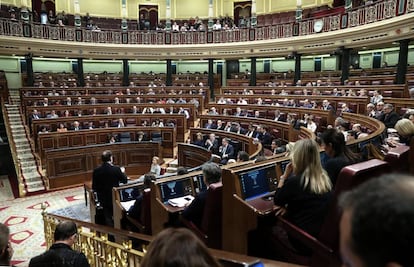The reasons behind Spain’s legislative paralysis
New multi-party system and the Catalan crisis are dragging the passage of new laws to an all-time low


Ever since the general elections of December 2015, Spain has been passing laws at the slowest pace of its entire democratic history. The repeat election of 2016 made that year the least productive in four decades. And the trend kept up in 2017, when Congress passed no more than 13 laws. It was the slowest non-election year since 1979.
The government has been resorting to decrees, which do not require parliamentary approval, in order to get things done: fully 59% of new Spanish laws during the present political term have been created that way. The figure is significantly higher than the previous record of 34% set during the first Mariano Rajoy administration, between 2011 and 2015.
The government has been resorting to decrees to get things done
In theory, low output does not necessarily indicate a lack of parliamentary activity or political disillusionment. Congress could merely be focusing on a few major bills requiring lengthy debate.
But that is not the case. The one organic law to get greenlighted in 2017 was to “guarantee participation of people with disabilities” in popular juries. And of the 12 ordinary laws that made it through, three were laws transposing EU directives, one was the 2017 budget, and another gave approval to the Cupo vasco, a special financing deal for the Basque Country.
As for the driving forces behind this legislation, only two bills were introduced by someone other than the governing Popular Party (PP): the Socialists (PSOE) pushed through a law to ensure greater independence at the state broadcaster, and Ciudadanos introduced a reform affecting self-employed workers.
A new surge?

Yet everything suggests that 2018 could be a bumper year for new legislation. In the 14 months that have elapsed since the last election, parties have introduced 161 bills in Congress. Most of these typically die a sudden death: the government can veto any project that increases spending, and sometimes lawmakers will propose a bill in the knowledge that they cannot secure a majority for it. But at least it looks like they’re doing something.
There are still over two years to go before the end of the term, which is plenty of time to match, or even surpass, the 322 bills that were introduced under the second José María Aznar administration, from 2000 to 2004.
There is an obvious reason for this surge in legislative activity: there are more parties in Congress now – Ciudadanos and Podemos both entered parliament at the 2015 election – and they want to prove that they have initiatives. Even if these are doomed to fail, at least they go on the records.
The unpleasant laws are always made by the government
“They get recorded, and later they get nowhere because of the government veto or else because the parties weren’t even that interested in the subject in the first place,” notes Cristóbal Herrera, lobby director for the consulting firm Llorente y Cuenca.
If there is one party that makes a lot of effort but sees few results, that is Unidos Podemos, the congressional group comprising Podemos, the United Left (IU) and other small leftist parties. This group has put forward 50 initiatives, nearly a third of the total. The PSOE accounts for 38, and Ciudadanos for 14. The PP has only presented 16.
Minority government
There are two main reasons for the slow production. The first is that this is Spain’s first truly minority government. And the second is Catalonia.
“A minority government is always like this,” says Roger Senserrich, a political scientist. “It needs to build specific majorities for each law, and the opposition does not want to hand the government any successes.”
The rules of the political game have changed in Spain. Votes are now shared out among four main parties, not two as was the case for decades. And nobody knows for sure anymore how their own voters will react to specific proposals.
“Most parties only worry about increasing their votes at the next election,” says Senserrich. Politicians act on incentives, and there is no better incentive than attracting votes.

During the two-party system, the rules were clear. “Everyone knew how things worked: the majority party would sometimes require support from a regional nationalist party that would provide this backing in exchange for infrastructure or some other local benefit,” says Herrera. “But that’s all gone now, and we now talk about a period of postnormality.”
And in the middle of this legislative muddle, the Catalan crisis made an entrance. “The Catalan problem has pushed everything else out of the debate,” says Senserrich. A CIS poll conducted in October showed Catalonia to be the second most serious problem in Spaniards’ opinion, after unemployment. This was a spectacular leap from previous surveys. Some political parties saw a chance to turn this into more votes, inside and outside Catalonia.
What next?
So what are Spain’s most pressing legislative needs right now? Basically everything, according to the experts. “The agenda of reforms is as broad as the imagination of any entrepreneurial politician can stretch,” says Jorge Galindo, a researcher at Geneva University.
José Fernández-Albertos, a political scientist at the science research council CSIC, says it is imperative to deal with “the scars of the [economic] crisis” that gripped Spain from 2008 to 2014. This could include initiatives on “minimum wage, youth policies, temporary jobs or the wounds created by lower spending on education.”
Besides that, regional funding remains on hold in a highly decentralized country where regional governments are in charge of critical services such as health and education. “The current system was approved in 2009, it should have undergone review after five years, yet there is no new agreement,” says Sandra León, who teaches at York University.
Bonanza
The most productive lawmaking year was 1980, when 112 acts and decrees were passed. But Spain had just emerged from a long dictatorship and there was an entire body of laws to build. The next big boom period was 1997 to 1999 under José María Aznar, who was heading the first alternative government after 14 years of Socialist rule.
Then came the bonanza years for the Spanish economy. Things were starting to crack, but nobody noticed.
“Those were comfortable years,” says Eloísa del Pino, a political scientist at CSIC. “This idea that everything is working fine prevents policies of redistribution. The chance to solve structural problems was not grabbed. During the mini-crisis of the 1990s, inequality shot up, and we were unable to revert it in the 2000s because we just didn’t feel like it.”
The agenda of reforms is as broad as the imagination of an entrepreneurial politician can stretch
Jorge Galindo, Geneva University
Del Pino says there were no lack of ideas for things like pension reform. But there was no political will to pull on the reins of an expanding economy.
Those changes were eventually and forcibly adopted during Mariano Rajoy’s first term in office, from 2011 to 2015. But by then Spain had been a fully functional country for decades, and changing the status quo is more complex than building a new system from the ground up. Besides, the crisis was not confined to Spain, and finding solutions required finesse: wanting to make reforms does not mean knowing how to do so.
Now that part of the crisis is behind us, the government seems at ease without a clear agenda. “The PP is a status quo kind of party, and failure to pass laws is not a tragedy for them,” notes Senserrich. Besides, the conservatives already passed all the laws they thought necessary during their previous term of office, when they had an absolute majority.
Meanwhile, the opposition seems disinclined to rock the boat. A leader from one of the new parties confessed that when you’re in the opposition, you are not going to propose anything that might harm or anger your own voters. This would mean losing votes needlessly. The unpleasant laws are always made by the government, particularly at the beginning of each term.
English version by Susana Urra.
Tu suscripción se está usando en otro dispositivo
¿Quieres añadir otro usuario a tu suscripción?
Si continúas leyendo en este dispositivo, no se podrá leer en el otro.
FlechaTu suscripción se está usando en otro dispositivo y solo puedes acceder a EL PAÍS desde un dispositivo a la vez.
Si quieres compartir tu cuenta, cambia tu suscripción a la modalidad Premium, así podrás añadir otro usuario. Cada uno accederá con su propia cuenta de email, lo que os permitirá personalizar vuestra experiencia en EL PAÍS.
¿Tienes una suscripción de empresa? Accede aquí para contratar más cuentas.
En el caso de no saber quién está usando tu cuenta, te recomendamos cambiar tu contraseña aquí.
Si decides continuar compartiendo tu cuenta, este mensaje se mostrará en tu dispositivo y en el de la otra persona que está usando tu cuenta de forma indefinida, afectando a tu experiencia de lectura. Puedes consultar aquí los términos y condiciones de la suscripción digital.








































